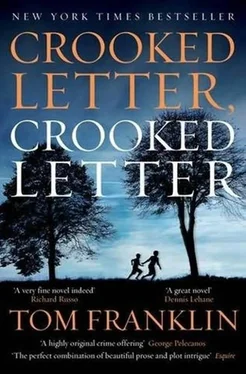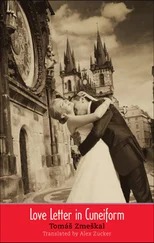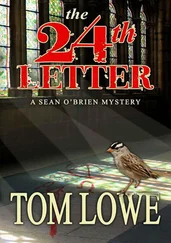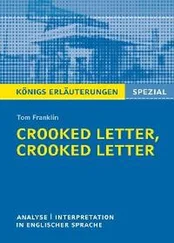“You okay, hon?” Voncille asked, rolling her chair back. Her desk was behind a cubicle wall she’d bought herself. She had blue eyes and a pretty, fat face and looked at him over her reading glasses. She was white, early fifties, divorced a couple of times. Her stack of stiff red hair seemed unperturbed by her morning of directing traffic.
“Yes, ma’am,” he said. “I will be.”
“Poor ole M &M,” she said. “Didn’t yall play ball together?”
“Back in the day we could turn the double bout as good as any two boys anywhere.”
“Yall still talk? I mean before.”
“Not really.”
She bunched her shoulders, both understanding and disapproving at the same time. But who did he see but other cops and the people he arrested? Just Angie. Who else did he need?
Voncille was back to work and Silas leaned forward. Out the window by his desk, propped up with an old Stephen King book, were Chabot’s other buildings: Mayor Mo’s real estate, the post office, a bank that was more of a credit union for the mill, a diner/convenience store called The Hub, an IGA grocery store and a drugstore, both going out of business because of the Wal-Mart in Fulsom. The third-to-last establishment, the Chabot Bus, was an old yellow school bus on blocks that had been converted into a bar, a counter at the back end and a few plastic tables and chairs inside and several more outside. Silas met Angie there for drinks a couple of times a week, later in the evening, after the mill crowd had gone home. The first time they met there, by accident, they’d closed the bar then made out in his Jeep until they knocked it out of gear and nearly rolled off into the gully before he pulled the emergency brake. Looking out the row of bus windows, you saw the last two buildings, empty offices with boarded windows. Silas checked them nightly for vagrants and crackheads. You saw, too, that Chabot had been built on the edge of a gully filled with kudzu, that snaky green weed nothing could kill. Somebody kept throwing trash in the gully, which brought raccoons and feral cats, roving stretches of ink in the leaves at night, fleet as spirits.
Chabot didn’t have an ATM; the nearest was eleven miles north, in Fulsom. Cell phones worked in Chabot sometimes and sometimes they didn’t. Because Gerald County, wet, was bordered on two sides by dry counties, the DUI tally was high. Fulsom was the county seat and, with its Wal-Mart, high cotton compared to Chabot’s little spate of stores. Chabot’s one barber had died, and his son had come and dismantled the building a piece at a time and carried it off in his pickup truck. Now its lot was vacant, an explosion of wildflowers and weeds, and if you wanted your hair cut, you went to Fulsom or did it yourself.
Because of the gully, Chabot’s buildings all faced east, like a small audience or a last stand: out Town Hall’s front windows, across the road and beyond strings of railcars and tankers, the tall, rumbling city of the Rutherford Lumber Mill. It blocked the trees behind it and burned the sky with smoke, one giant metal shed after another, smokestacks with red bleeping lights, conveyor belts and freight elevators below, log trucks, loaders and skidders beeping backward or grinding over sawdust to untusk limber green logs soon to be cut to planks and treated or creosoted for poles. The mill boomedgnashed-screeched and threw its boards and sparks and dust and exhaled its fumes sixteen hours a day, six days a week. Two eight-hour shifts and a six-hour maintenance shift. Its offices were a two-story wooden structure a hundred yards past the mill, two dozen people there, accountants, salesmen, secretaries, administration. Some even got company trucks, big green Ford F-250s with four-wheel drive.
Not Silas. He wasn’t a mill employee per se, so he got what Chabot could afford. His Jeep, purchased at auction, was over thirty years old. It had an emphysemic air conditioner and a leaky master cylinder, an addict to both Freon and brake fluid. Not to mention oil. Its odometer had stopped on 144,007. When he complained it was an old mail Jeep, Voncille said, “Count your blessings, 32. You lucky the steering wheel’s on the right, and by that I mean left, side.”
Around one, French called to say he was at The Hub across the parking lot. Did Silas want anything?
“ Hell naw,” he said and the chief laughed and hung up.
A few minutes later he came in the front door with a greasy brown bag and a Coke and took Mayor Mo’s desk and uncrinkled the sack and removed an oyster po’boy.
“Where’s his highness?”
Silas raised his chin. “Out buying land.”
“Roy,” Voncille said, leaning around her cubicle, pictures of her kids push-pinned over nearly every inch of it. “I don’t see how you can eat from the same place every day.”
“Hell,” he said, chewing, “ain’t got no choice. I done arrested somebody or other in ever goddamn joint in the county. Busboys, dishwashers, waitresses, fry cooks, owners, silent partners. Marla”-the cook at The Hub-”she’s got a get-out-of-jail-free pass up to and including premeditated murder, long as she keeps feeding me. I gotta eat.”
“What about Linda?”
Chewing. “Time she gets off work she don’t do nothing but sit in front of the TV watching reality.”
When he finished his last bite he wadded the paper into a ball and threw it into the wastebasket by Silas’s desk. He slurped the rest of his Coke and got his Camels and shook one out.
“Don’t you light that,” Voncille called.
French lit it anyway, grinning at her sigh, the way she stapled harder.
“FYI,” he told Silas. “Paid me a visit to Norman Bates other day.”
Silas glanced over. “Who?”
“From Psycho, ” Voncille said. “He means Larry Ott.”
French blew a ray of smoke. “Always do it with a missing person, especially a girl. You know. The usual suspects.”
Silas frowned. “You think Larry had something to do with the Rutherford girl?”
“‘Larry’?”
Silas regretted saying it. “I was in school with him’s all. Knew him a little way back when.”
“He didn’t play ball, did he?” Voncille asked.
“Naw. Just read books.”
“Horror books,” French said. “His house is full of em.”
“Find any dismembered bodies?”
“Nah. I’ll run by his shop a little later. See if I can spook him some more. Went this morning but he wasn’t open yet.”
“What time?” Silas asked.
He thought about it. “Twenty minutes ago.”
“Shop wasn’t open?”
The CI shook his head.
Silas creaked back in his chair and folded his arms. “You ever know of him not being open during business hours?”
“So what. He ain’t had a customer in I don’t know how long. Don’t matter if he’s in or not.”
“Yeah, but that ain’t never stopped him from being there’s what I’m saying. Monday through Saturday, regular as clockwork. Don’t even take lunch usually.”
“Guess who’s the detective now,” French said, reclining in the mayor’s chair. He stretched out his legs and adjusted his ankle holster with the opposite foot. “You ever see that other movie Alfred Hitchcock did, Voncille?”
“Which one?”
“ The Birds ?”
“Long time ago.”
“All them buzzards and crows this morning reminded me of it. Seen it at the drive-in, when we was younguns. After it was over my little brother says, ‘You know what? I wish that really would happen. With birds like that. Just going crazy. We could find us some football helmets and a bunch of guns and ammo and go on the road, just killing birds and saving people.’ ”
Silas barely heard. He was thinking of how, not long after he’d returned to south Mississippi, Larry Ott had called and left him a message on his home phone.
Читать дальше












